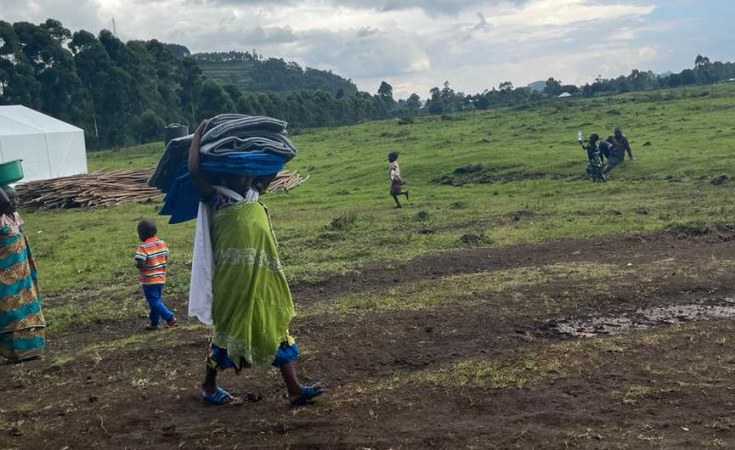The number of refugees entering Rwanda from eastern DR Congo has passed 4,300, according to new figures obtained by The New Times show.
On Wednesday, February 1, Rwandan authorities received 184 Congolese citizens, mostly women and children, fleeing insecurity in North Kivu province, where government forces are once more fighting the M23 rebels. Since last week, heavy fighting has been reported in different parts of North Kivu, with the M23 rebels capturing Kitchanga, a key town in Masisi territory.
According to the Ministry of Emergency Management (MINEMA), 4,303 Congolese citizens have fled to Rwanda since November 2022.
About 1,760 of the refugees are accommodated in Mahama Refugee Camp, in Kirehe District and 1,598 are at Nkamira Transit Centre, an emergency camp set up in mid-January.
More than 800 of the Congolese refugees are hosted at Kijote Transit Centre in Nyabihu District.
Following reports of a deteriorating security situation, Uhuru Kenyatta, Kenya's former president and facilitator of East African Community-led peace efforts for DR Congo, on Tuesday convened an urgent meeting with the bloc's technical advisors. Kenyatta called for cessation of hostilities and reminded the parties to the conflict to respect a November 2022 peace agreement signed by regional leaders in Luanda, Angola.
The Congolese government is accused of ignoring the Luanda agreement, under which it was required to disarm the FDLR militia and initiate a mechanism for the repatriation of tens of thousands of refugees who live in neighbouring countries, including Rwanda.
There are over 72,000 Congolese refugees in Rwanda alone. Some of them have spent 27 years in camps. Others are scattered in Uganda and Kenya, among other countries.
Representatives of the more than 72,000 Congolese refugees who live in Rwanda on January 23 submitted petitions to different embassies in Kigali, calling on the international community to help stop the killings and persecution of the Tutsi community in eastern DR Congo.
The January petition came more than one month after they organised peaceful protests against ethnic violence in North Kivu and South Kivu provinces. It followed another petition by the Congolese refugee community in Kenya submitted a week earlier to delegations of the United Nations, European Union, African Union, the East African Community and embassies of the United States, France, among others, in Nairobi.
Before the renewed fighting had started, the M23 rebels had started to implement the agreement, with their withdrawal from occupied positions in Kibumba and the Rumangabo military camp, and others.
Peace talks between multiple armed groups based in eastern DR Congo and the Kinshasa government are planned to resume this month.
During the initial round of talks hosted in Nairobi, the M23 was side-lined as Kinshasa called it a terrorist group it did not want to talk to. It is not yet clear if the group will be represented in the fourth round, due to take place in eastern DR Congo, probably in the cities of Goma or Bukavu.
But what really is the real reason why these refugees exist in the first place?
The influx of refugees is, largely, the consequence of racial hate speech that is growing in North Kivu and South Kivu provinces.
Following her official visit to the DR Congo in November 2022, the UN Special Adviser on the Prevention of Genocide, Alice Wairimu Nderitu, was deeply alarmed about the escalation of violence in the region where a genocide - the 1994 Genocide against the Tutsi in Rwanda - happened.
The current violence in the region mainly stems from the refugee crisis that resulted as many individuals involved in the 1994 Genocide against the Tutsi in Rwanda fled to eastern DR Congo, forming armed groups such as the FDLR which is still active in eastern DRC, the Special Adviser said.
Kigali continues to ask the international community to take responsibility for finding a durable solution for "this forgotten group of refugees" from the DR Congo.
The Rwandan government is especially angered by what it sees as "blatant hypocrisy" in criticising Rwanda which simultaneously gets the blame for "state failure" in DR Congo, when Kigali is then "expected to accommodate those who seek refuge from the consequences of that failure," Rwandan Government Spokesperson, Yolande Makolo, said in early January as she dispelled reports that Rwanda would not allow Congolese refugees in.
Kinshasa constantly accuses Kigali of being the cause of insecurity in eastern DR Congo.
But the endemic security challenges in the restive region have much to do with the existence of more than 130 local and foreign armed groups. Eastern DR Congo has especially been in a state of almost permanent instability since 1994 when the then government welcomed and gave a safe haven to the perpetrators of the 1994 genocide against the Tutsi in Rwanda.
Kinshasa's continued collaboration with these armed groups, including FDLR - a genocidal militia formed by perpetrators of the 1994 genocide - that target Congolese Tutsi and fuel ethnic tensions and hate speech.
The Congolese Tutsi communities continue to be subjected to widespread hate speech, discrimination, hostility, and violence rooted in the genocide ideology revived by the genocidal militia FDLR and embraced by the Congolese leadership and security apparatus.
People responsible for these crimes are not held accountable by the Congolese government, as detailed in the report of the UN Group of Experts on DR Congo.
Nonetheless, Congolese leaders have, for long, used a repeated but similar narrative to scapegoat Rwanda for their failures to offer the Congolese people a safe and dignified life.
By and large, the Congolese government, through its denial of the existence of Congolese refugees in Rwanda, observers say, is trying to divert attention from the real reasons why these refugees exist in the first place.


